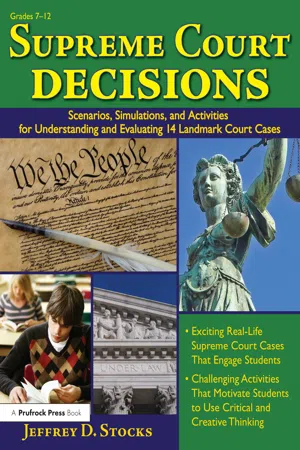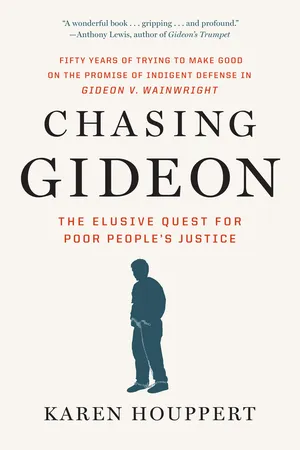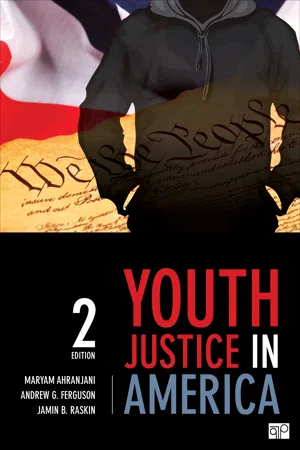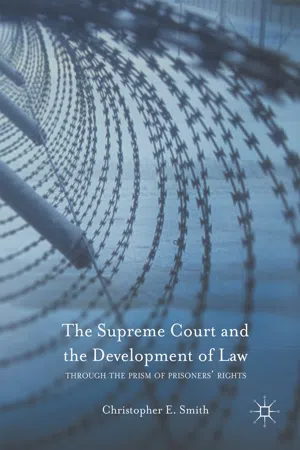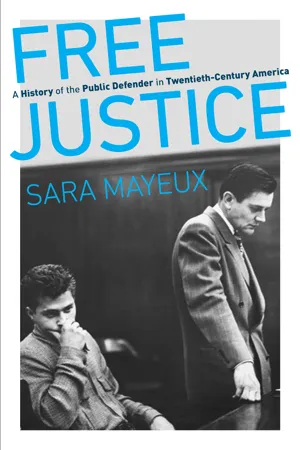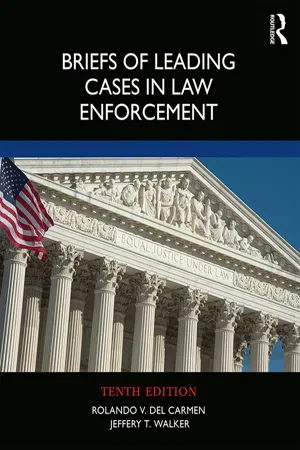Gideon v. Wainwright
"Gideon v. Wainwright" was a landmark U.S. Supreme Court case in 1963 that established the right to legal counsel for criminal defendants who are unable to afford an attorney. The ruling held that state courts are required to provide counsel in criminal cases for defendants who cannot afford their own representation, ensuring fair trials and due process for all individuals.
6 Key excerpts on "Gideon v. Wainwright"
- eBook - ePub
Supreme Court Decisions
Scenarios, Simulations, and Activities for Understanding and Evaluating 14 Landmark Court Cases (Grades 7-12)
- Jeffrey D. Stocks(Author)
- 2021(Publication Date)
- Routledge(Publisher)
...Brady (1942) “was wrong” (Gideon v. Wainwright, 1963). T HE A FTERMATH Gideon v. Wainwright (1962) is remarkable on several levels. On a personal level, Clarence Earl Gideon’s persistence in studying the law and arguing his case is an inspirational story of the little man beating the odds. States would now be required to provide counsel to defendants who could not afford to hire their own. But, in the bigger picture, this case represents the expanded protections of the U.S. Constitution from abuse by the states. It also signifies the increased role of the Supreme Court in the protection of individual liberties. M AKING I T C URRENT Does the wealth of an accused criminal make a difference in the judicial process? What evidence have you seen to support your opinion?...
- eBook - ePub
Chasing Gideon
The Elusive Quest for Poor People's Justice
- Karen Houppert(Author)
- 2010(Publication Date)
- The New Press(Publisher)
...With him gone, Betts was clearly in jeopardy. Gideon stood a good chance of winning. Finally, on January 15, 1963, the Supreme Court heard oral arguments in Gideon v. Wainwright. Everyone in the legal community understood the huge ramifications of this decision—and all eyes were on the court. The morning before, Bruce Jacob had to arrange for his admission to the Supreme Court Bar—a prerequisite to arguing before the court. A lawyer is eligible only after three years practicing in a state’s highest court. Jacob barely made the requirement. Meanwhile Fortas, who had argued before the U.S. Supreme Court on numerous occasions, used his casual Tennessee twang to soften his sharp arguments. He began by assuring the judges that they were deciding an easy, “narrow” issue. “The question, of course, is the right of accused in State criminal proceedings to the appointment of counsel. . . . In the present case which you have before you, the question is an exceedingly narrow one,” he began. “The question in the present case is whether. . . the accused being concededly indigent, it is the duty of the State to accede to that request and to appoint counsel.” 28 He went on to build his case by explaining why the Betts Rule did not apply, and yet had, in any case, become completely obsolete. “This record. . . does not indicate that Clarence Earl Gideon is a man of inferior natural talents,” he said. “This record does not indicate that Clarence Earl Gideon is a moron or a person of low intelligence. This record does not indicate that the judge of the trial court in the state of Florida, or that the prosecuting attorney in the state of Florida, was derelict in his duty. On the contrary, it indicates that they tried to help Gideon. But to me, if the Court please, this record indicates the basic difficulty with Betts against Brady...
- eBook - ePub
- Maryam Ahranjani, Andrew G. Ferguson, Jamin B. Raskin(Authors)
- 2014(Publication Date)
- CQ Press(Publisher)
...Wainwright The Supreme Court in Powell held that the Sixth Amendment and the Due Process Clause were violated when the accused did not have government-appointed counsel in a death penalty case. What about cases in which imprisonment, but not death, is the punishment? The vast majority of cases do not involve the death penalty. What about the right to lawyers in these cases? Up to 1963, people accused of crimes, even serious felonies, did not get a lawyer unless they could afford to hire one. The courts interpreted the Constitution’s right-to-counsel language only as protecting the right to bring your own lawyer to trial, not as an affirmative requirement that the state provide a lawyer free of charge. This view changed when a poor, uneducated prisoner named Clarence Earl Gideon sat down in his jail cell and wrote a letter to the U.S. Supreme Court demanding that his conviction be reversed because he did not have a lawyer at trial. The door thus was opened for any poor criminal defendant to have a government-appointed lawyer at a felony trial. The Case. The story of Clarence Earl Gideon shows that individuals who stand up for their rights can make a difference in the justice system. Gideon was poor, carried a lengthy criminal record, and had no legal education. As he was described by Anthony Lewis, a famed news reporter who wrote a book on Gideon’s case: [T]hose who had known [Gideon], even the men who had arrested him and those who were now his jailers, considered Gideon a perfectly harmless human being, rather likeable, but one tossed aside by life. Anyone meeting him for the first time would be likely to regard him as the most wretched of men. And yet a flame still burned in Clarence Earl Gideon. He had not given up caring about life or freedom; he had not lost his sense of injustice. 16 Gideon was accused of breaking into and trying to steal money from a poolroom in Florida. He was arrested and brought to trial in Florida State court...
- eBook - ePub
The Supreme Court and the Development of Law
Through the Prism of Prisoners' Rights
- Christopher E. Smith(Author)
- 2016(Publication Date)
- Palgrave Macmillan(Publisher)
...In effect, the law and policy produced by the Gideon decision already enjoyed broad political support throughout nearly the entire country. The Supreme Court’s justices were primed to receive a case that would provide the opportunity to make a declaration advancing the Sixth Amendment right to counsel and Gideon’s case arrived at the right moment to enable them use it as a vehicle for their pronouncement. The more notable and extraordinary instances of political minorities succeeding in the litigation process involve those who experienced social ostracism and bloody persecution in order to push forward matters of principle that did not enjoy widespread public support. African Americans pursued litigation to advance equal protection principles and many such individuals courageously endured death threats, pretextual arrests, assaults, and house bombings (Irons 1988). Similarly, Jehovah’s Witnesses endured violent persecution and social ostracism during the 1930s and 1940s, in particular, for using the litigation process to assert principles of religious freedom under the First Amendment (Peters 2000). For the cases that reached the Supreme Court from these two political minorities, their arguments enjoyed the advantages of presentation by expert attorneys with support from organized interest groups. In the case of Jehovah’s Witnesses, their religious sect’s lead attorney, Hayden Covington, took 45 cases to the Supreme Court from the late 1930s to the mid-1950s and gained majority support from the justices in 36 of those cases (Walker 1990, 107). In many of these cases, additional arguments were presented in support of the Jehovah’s Witnesses by the American Civil Liberties Union (ACLU) and the American Bar Association (ABA)...
- eBook - ePub
Free Justice
A History of the Public Defender in Twentieth-Century America
- Sara Mayeux(Author)
- 2020(Publication Date)
- The University of North Carolina Press(Publisher)
...But the nation’s oldest public defender was not immune to the larger changes that Gideon augured. After 1965, state-level legislative changes in California guaranteed a public defender in misdemeanor cases, prefiguring the Supreme Court’s extension of Gideon to serious misdemeanors in 1972. Along with rising criminal caseloads generally, the expansion threatened to overwhelm the Los Angeles public defender with “an ever increasing demand for services.” 8 What is notable about these quotations is that Massachusetts, California, and Georgia were all states that, according to law on the books, already made some provision for appointed counsel prior to Gideon. For example, the Georgia Supreme Court had interpreted the state constitution to require appointed counsel for indigent defendants as early as 1874. 9 As these reactions demonstrate, Gideon occasioned worry among lawyers on the ground, in states all around the nation, regardless of what steps their states had taken prior to Gideon. That was true for at least three reasons. First, even though Supreme Court observers had been expecting a case like Gideon, the stakes became higher once it had actually been decided. Defendants denied their right to counsel were no longer limited to state remedies but could cite federal constitutional law or file a federal habeas petition. Second, national organizations promoted Gideon not only as a case about appointed counsel, but also as an impetus to establish or expand public defender agencies. Following that guidance would require an overhaul of local court procedures in states like Georgia that provided counsel through the traditional method of trial judges appointing private lawyers case by case. Finally, Gideon in these discussions symbolized something larger—the Warren Court’s ongoing campaign to transform the Bill of Rights into a national “code of criminal procedure”—and no one yet knew where that campaign would ultimately end...
- eBook - ePub
- Rolando V. del Carmen, Jeffery T. Walker(Authors)
- 2019(Publication Date)
- Routledge(Publisher)
...Left without aid of counsel, he may be put on trial without proper charge, and convicted upon incompetent evidence irrelevant to the issue or otherwise against him. Without counsel, though he may not be guilty, he faces the danger of conviction because he does not know how to establish his innocence.” CASE SIGNIFICANCE: The Sixth Amendment to the Constitution provides that “in all criminal prosecutions, the accused shall enjoy the right … to have the assistance of counsel for his defense.” This case provides the often-quoted reason (penned by Justice Sutherland) for this constitutional provision. Without a lawyer, an accused may be convicted, not because he or she is guilty, but because “he does not know how to establish his innocence.” The right to counsel is a basic and fundamental right under the Constitution and must be respected by the police. Note that, in this case, the Court used the due process clause of the Fourteenth Amendment rather than the Sixth Amendment right to counsel to overturn the convictions. This is because, in 1932, when the case was decided, the provisions of the Bill of Rights had not yet been extended to state proceedings. Were this case to be decided today, the Sixth Amendment right to counsel provision would have been used. Gideon v. Wainwright 372 U.S. 335 (1963) CAPSULE: A lawyer must be appointed for an indigent who is charged with a felony offense in state court. FACTS: Gideon was charged in a Florida state court with breaking and entering a poolroom with intent to commit a misdemeanor, an act classified as a felony offense under Florida law. Appearing in court without funds and without a lawyer, Gideon asked the court to appoint a lawyer for him. The court refused, saying that under Florida law the only time the court could appoint a lawyer to represent an accused was when the crime charged was a capital offense...
